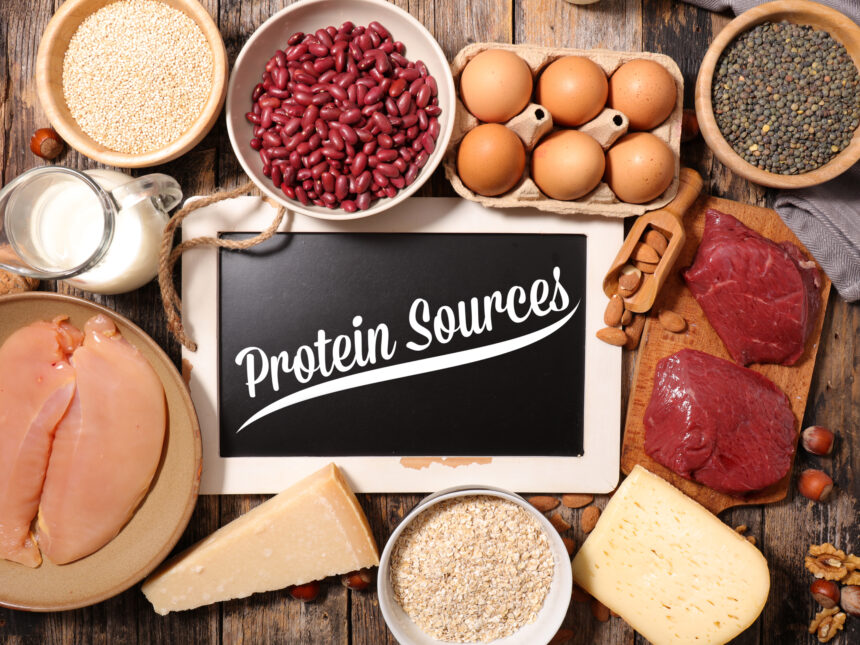Protein is more than just a muscle-builder, it’s one of the most effective nutrients for maintaining a healthy weight.
Introduction
When it comes to weight management, protein often takes center stage and for good reason. Unlike carbohydrates and fats, protein has a high thermic effect, meaning your body burns more calories digesting it.
It also promotes satiety, helping you stay full for longer periods and curb unnecessary snacking.
But not all protein sources are created equal. Some are rich in essential amino acids and healthy fats, while others may come with excess sodium or saturated fat.
Whether you’re aiming to lose weight, maintain it, or simply eat healthier, knowing the best protein sources can make a big difference in your results and overall well-being.
Animal-Based Protein Sources
Animal-based proteins are highly bioavailable, meaning your body can absorb and use them efficiently.
They’re rich in essential amino acids, vitamins, and minerals that help preserve lean muscle and support a healthy metabolism during weight management.
1. Lean Poultry (Chicken and Turkey)
Chicken and turkey are among the most popular protein sources for people focused on weight management.
Skinless chicken breast, in particular, provides a high-protein, low-fat option that supports muscle repair without adding excess calories.
Turkey is also lean and rich in B vitamins, which are essential for energy metabolism. Grilled, baked, or steamed poultry options are best if you’re watching your calorie intake.
2. Fish and Seafood
Fish is not only an excellent source of lean protein but also packed with omega-3 fatty acids beneficial fats that support heart health and reduce inflammation.
Fatty fish like salmon, mackerel, and sardines offer high-quality protein along with healthy fats that may actually help regulate body weight by improving metabolic health.
White fish like tilapia and cod are also great low-fat options for those seeking leaner protein sources.
3. Eggs
Eggs are a complete protein source, containing all nine essential amino acids. They’re also rich in choline, a nutrient that supports brain function and metabolism.
Contrary to old myths, moderate egg consumption doesn’t raise cholesterol levels in healthy individuals.
A boiled or poached egg at breakfast can help control hunger throughout the day, reducing overall calorie intake.
4. Low-Fat Dairy Products
Dairy foods such as Greek yogurt, cottage cheese, and skim milk are excellent protein sources that also provide calcium and probiotics for gut health.
Greek yogurt, in particular, contains almost twice as much protein as regular yogurt and can be used in smoothies, parfaits, or as a base for healthy dips.
Choosing unsweetened or low-fat varieties can help you reduce added sugar and saturated fat intake while keeping you satisfied longer.
MUST READ:10 Common Health Myths You Probably Still Believe
Plant-Based Protein Sources
Plant proteins provide a nutrient-rich, fiber-packed alternative to animal protein. They not only support healthy digestion and heart health but also help maintain satiety and muscle strength for sustainable weight management.
5. Legumes (Beans, Lentils, and Chickpeas)
Legumes are nutrient-dense and high in both protein and fiber, a powerful combination for appetite control and digestive health.
Lentils and chickpeas, for example, promote a feeling of fullness while providing slow-digesting carbohydrates that help regulate blood sugar.
Adding legumes to soups, salads, or stews can make your meals more filling without dramatically increasing calories.
6. Soy-Based Foods (Tofu, Tempeh, and Edamame)
Soy is one of the few plant-based proteins that provides all essential amino acids, making it a complete protein source.
Tofu and tempeh are versatile ingredients that can replace meat in many dishes, offering a satisfying texture and mild flavor.
Edamame young soybeans are also great as a snack or salad topping. Regular soy intake has been linked to improved cholesterol levels and better metabolic health.
7. Nuts and Seeds
Almonds, chia seeds, pumpkin seeds, and hemp seeds are excellent sources of plant protein and healthy fats.
While nuts are calorie-dense, their combination of protein, fiber, and unsaturated fats helps keep you full and prevent overeating.
Sprinkle seeds on smoothies, oatmeal, or salads for a nutrient boost, but be mindful of portion sizes if you’re monitoring your calorie intake.
8. Whole Grains (Quinoa, Amaranth, and Oats)
Whole grains like quinoa and amaranth are unique because they contain more protein than most other grains and are complete protein sources.
Oats also offer a moderate amount of protein alongside soluble fiber, which supports digestion and cholesterol balance.
Combining grains with legumes or seeds can further enhance the protein quality in plant-based meals.
How Much Protein Do You Really Need?
The recommended daily intake of protein depends on your weight, activity level, and goals. Generally, adults should aim for 0.8 to 1.2 grams of protein per kilogram of body weight, but those who exercise regularly or are trying to lose fat while preserving muscle may need slightly more.
Distributing your protein intake evenly throughout the day rather than loading it all into one meal improves muscle protein synthesis and supports consistent energy levels.
Final Thoughts
Protein plays a crucial role in managing weight by promoting satiety, preserving muscle mass, and supporting a healthy metabolism.
Whether you prefer animal-based or plant-based options, the goal is to include a variety of high-quality protein sources in your daily diet.
By making mindful choices like choosing grilled fish over fried, or adding lentils to your salad you can maintain a balanced, sustainable approach to weight management without feeling deprived.


